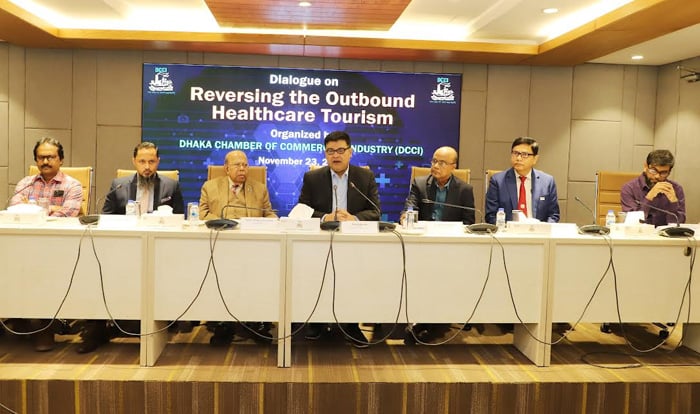
DHAKA, Nov 23, 2024 (BSS) – Dhaka Chamber of Commerce and Industry (DCCI) President Ashraf Ahmed today said that Bangladesh needs to do better in terms of quality medical services, provide better customer satisfaction, and need to become more reliable both in measurable index and branding.
“In a bid to reverse the trend of outbound medical tourism, we need to outperform in the regional competition. We need to be better in terms of quality medical services, provide better customer satisfaction and most importantly be more reliable both in measurable index and branding,” he said.
The DCCI President was addressing a seminar on “Reversing the Outbound Healthcare Tourism” held at DCCI auditorium in the capital.
In his opening remarks, Ashraf said that a larger number of middle income households have been seeking healthcare services abroad.
While many of the treatments are available locally, but the demand for medical tourism keeps growing unabated, he added.
Ashraf said that the local healthcare services industry insiders need to remember that customer satisfaction comes not just from the treatment, but also from the whole ecosystem, which is run by everyone in a hospital from nurses, administration, and medical technologists.
“We need to be more open to foreign doctors, nurses, medical technologists and other specialists,” Ashraf said.
According to WTO data, he said 49 percent of the people of Bangladesh do not have access to quality healthcare while the tendency to seek healthcare services from abroad is increasing due to lack of international standards required in local market.
The DCCI president also underscored the need for ensuring the use of advanced infrastructures and modern technology for the development of the country’s healthcare ecosystem, increasing budgetary support, launching the chain of international hospitals in Bangladesh, simplifying the registration process for foreign doctors and nurses to operate in Bangladesh, removing the procedural complexities of obtaining and renewing all types of licenses in the health sector and introducing digital system and providing tax exemption facilities to encourage private sector hospital operations in remote areas of the country.
Malik Talha Ismail Bari in his keynote paper said the budget in the health sector is not sufficient. In 2024-25 FY, the allocations in the health sector were TK 30,125 crore which was 3.78 percent of the total budget.
He said where per-capita health expenditure in South Asia is $401 in PPP, but in Bangladesh it is only $110. In 2021, Bangladesh's health expenditure as a share of GDP was 2.36 percent, he added.
The size of the overseas healthcare tourism from Bangladesh was recorded around $4 billion in 2012.
Due to lack of specialized treatment, trust and perception, availability of advanced technology, competitively lower price, the local patients seek healthcare abroad. Among 36 specialized hospitals, 19 are located in the Dhaka District, while 17 are spread across the rest of the country.
There are a total of 5,461 private hospitals and clinics in Bangladesh, of them, 1,810 are in the Dhaka division. And that is why; people of rural areas are deprived of getting quality and adequate healthcare services that creates pressure on Dhaka, added the presentation.
Limited infrastructures, skilled workforce, quality and safety concern, low doctor-patient ratio, long waiting time are some of the bottlenecks to accessing advanced healthcare in Bangladesh.
National Professor Dr. A K Azad Khan, President, Bangladesh Diabetic Samity said due to lack of facilities, trust and comfort, patients sometimes go abroad to have healthcare services.
“To reverse the outbound patients, we need to do a proper plan and identify the bottlenecks. Since, the medical science is an ever changing process as far as the technology is concerned, it will be changed in next 25 years than what we have now,” he added.
He also stressed for standardization of labs, adequate budget allocation, facilitating more research and strengthening the BMDC.
Dr. Md. Liaquat Hossain, Registrar (Acting), Bangladesh Medical & Dental Council (BM&DC) said there is a national policy for registering foreign doctors but the process can be easier further. “Moreover, we have to give more efforts on creating skilled professionals in this sector,”
Dr. Syed Abdul Hamid, Professor & Former Director, Institute of Health Economics, demanded separate health cadres excluded from the civil service for operating efficiently health administration alone.
Moreover, he suggested forming a Health Service Commission like the Judiciary Service Commission to make this sector more functional.
Dr. Rezaul Karim Kazal, Professor, Department of Obstetrics & Gynaecology, BSMMU said there is a need to transform the healthcare to health care tourism.
Dr. Abul Bashar Md. Jamal, Professor of Surgery, Dhaka Medical College Hospital said that Bangladesh is now a producer of medicines and also exports those in various countries, but in producing medical devices, the country is still lagging behind.
Dr. Mir Saaduddin Ahmad, Secretary General, Bangladesh Society of Emergency Medicine, said that during the Covid-19 pandemic , no one went abroad to take treatment. “At that time we managed to handle the situation, it reflects our capability in the healthcare sector.”